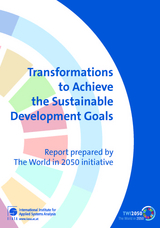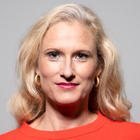External publications

Synthesis
Messner, Dirk / Jeff Sachs / Nebojsa Nakicenovic / Johan Rockström / Guido Schmidt-Traub / Sebastian Busch / Geoff Clarke / Owen Gaffney / Elmar Kriegler / Peter Kolp / Julia Leininger / Keywan Riahi / Sander van der Leeuw / Detlef van Vuuren / Caroline ZExternal Publications (2018)
in: Elmar Kriegler / Dirk Messner / Nebojsa Nakicenovic / Keywan Riahi / Johan Rockström / Jeffrey Sachs / Sander van der Leeuw / Detlef van Vuuren (eds.), Transformations to achieve the sustainable development goals; Report prepared by The World in 2050 Initiative, Laxenburg: International Institute for Applied Systems Analysis (IIASA), 7-28
On 25 September 2015, all 193 United Nations (UN) Member States unanimously adopted the 2030 Agenda for Sustainable Development with the 17 Sustainable Development Goals(SDGs) (UN, 2015b), which placed sustainable development as the core principle of global cooperation and national development. The 2030 Agenda provides an aspirational narrative for the desired future for human development together with an actionable agenda to be achieved by 2030. It specifies far-reaching time-bound, often quantified, objectives based on the most comprehensive consultation held so far among nations.For the first time, a world development agenda is adopted that integrates wide-ranging and aspirational goals for inclusive social and economic development, to occur within global environmental targets for oceans, freshwater, biodiversity, and climate, i.e., essentially a roadmap for redefining sustainable development as a people and planet agenda for achieving a prosperous and fair world within planetary boundaries. The Paris Agreement adopted a few weeks later (12 December 2015) reiterated the basic objective of sustainable development and established an agreed upper limit for human-induced global warming to “well below 2°C” and “pursuing efforts to limit the temperature increase to 1.5°C” (UNFCCC, 2015). The Addis Ababa Action Agenda adopted a few months earlier (16 July 2016) provided a new global framework for financing 2030 Agenda and emphasized the importance of science, technology and innovation for achieving the SDGs (UN, 2015a).
The World in 2050 (TWI2050) initiative endeavors to demonstrate how the objectives of sustainable development within planetary boundaries can be met, ensuring prosperity, social inclusion, and good governance for all. TWI2050 is a global research initiative launched by the International Institute for Applied Systems Analysis (IIASA), the Sustainable Development Solutions Network (SDSN), and the Stockholm Resilience Centre (SRC). The initiative brings together a network of more than 150 participants that includes leading policymakers, analysts, modeling and analytical teams from 60 organizations from around the world to collaborate in developing pathways toward sustainable futures and the policy frameworks needed for implementing the SDGs, and more importantly, for achieving the needed transformational change. This report of the international TWI2050 scientific initiative was prepared by more than 60 authors and 20 organization and was launched at UN High-level Political Forum, 9-18 July 2018.
Contact
Cornelia Hornschild
Publication Coordinator
E-mail Cornelia.Hornschild@idos-research.de
Phone +49 (0)228 94927-135
Fax +49 (0)228 94927-130
Alexandra Fante
Librarian/ Open Access Coordinator
E-Mail Alexandra.Fante@idos-research.de
Telefon +49 (0)228 94927-321
Fax +49 (0)228 94927-130




![[Translate to English:] Photo: Alexandra Fante, Bibliothekarin/Open Access-Koordinatorin](/fileadmin/_processed_/f/0/csm__c_Deutsches-Institut-fuer-Entwicklungspolitik_Fante_94ce4fa1ba.jpg)